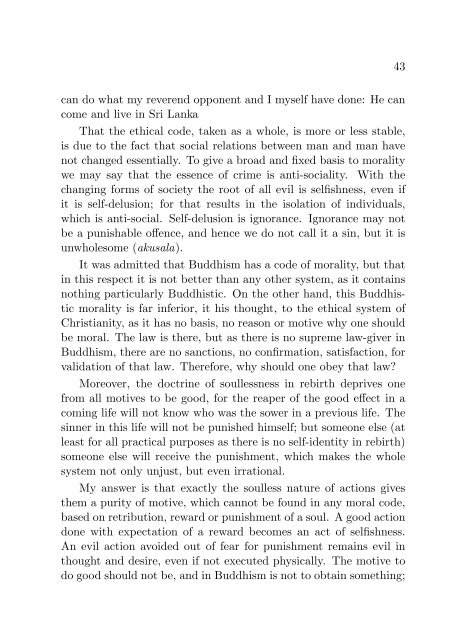Towards the Truth
Notes from a three-day debate in the 1940’s about Buddhism and Christianity.
Notes from a three-day debate in the 1940’s about Buddhism and Christianity.
You also want an ePaper? Increase the reach of your titles
YUMPU automatically turns print PDFs into web optimized ePapers that Google loves.
43<br />
can do what my reverend opponent and I myself have done: He can<br />
come and live in Sri Lanka<br />
That <strong>the</strong> ethical code, taken as a whole, is more or less stable,<br />
is due to <strong>the</strong> fact that social relations between man and man have<br />
not changed essentially. To give a broad and fixed basis to morality<br />
we may say that <strong>the</strong> essence of crime is anti-sociality. With <strong>the</strong><br />
changing forms of society <strong>the</strong> root of all evil is selfishness, even if<br />
it is self-delusion; for that results in <strong>the</strong> isolation of individuals,<br />
which is anti-social. Self-delusion is ignorance. Ignorance may not<br />
be a punishable offence, and hence we do not call it a sin, but it is<br />
unwholesome (akusala).<br />
It was admitted that Buddhism has a code of morality, but that<br />
in this respect it is not better than any o<strong>the</strong>r system, as it contains<br />
nothing particularly Buddhistic. On <strong>the</strong> o<strong>the</strong>r hand, this Buddhistic<br />
morality is far inferior, it his thought, to <strong>the</strong> ethical system of<br />
Christianity, as it has no basis, no reason or motive why one should<br />
be moral. The law is <strong>the</strong>re, but as <strong>the</strong>re is no supreme law-giver in<br />
Buddhism, <strong>the</strong>re are no sanctions, no confirmation, satisfaction, for<br />
validation of that law. Therefore, why should one obey that law?<br />
Moreover, <strong>the</strong> doctrine of soullessness in rebirth deprives one<br />
from all motives to be good, for <strong>the</strong> reaper of <strong>the</strong> good effect in a<br />
coming life will not know who was <strong>the</strong> sower in a previous life. The<br />
sinner in this life will not be punished himself; but someone else (at<br />
least for all practical purposes as <strong>the</strong>re is no self-identity in rebirth)<br />
someone else will receive <strong>the</strong> punishment, which makes <strong>the</strong> whole<br />
system not only unjust, but even irrational.<br />
My answer is that exactly <strong>the</strong> soulless nature of actions gives<br />
<strong>the</strong>m a purity of motive, which cannot be found in any moral code,<br />
based on retribution, reward or punishment of a soul. A good action<br />
done with expectation of a reward becomes an act of selfishness.<br />
An evil action avoided out of fear for punishment remains evil in<br />
thought and desire, even if not executed physically. The motive to<br />
do good should not be, and in Buddhism is not to obtain something;
















